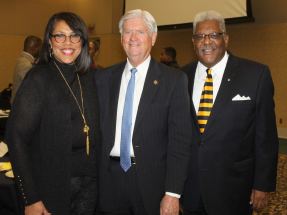
Administrative Office of Courts
|
Chief Justice Randolph addresses country’s historical reliance on Providence, calls for civility and nonviolence January 20, 2020 Mississippi Supreme Court Chief Justice Mike Randolph on Monday issued a plea for civility and non-violence and addressed this country’s historical reliance on Providence. 
Speaking in Hattiesburg to more about 600 people gathered to honor the legacy of Dr. Martin Luther King Jr., the state’s top jurist said the civil rights icon’s life and teachings are a model by which all people can live in peace. “Dr. King wanted all denominations and people to treat each other as equals,” the Chief Justice said at the fourteenth annual Ecumenical and Multicultural Prayer Breakfast, hosted by Alpha Phi Alpha Fraternity, Inc. on the University of Southern Mississippi campus. Prayers were offered by worshipers of Christianity, Islam and Judaism. Jalil Butico of the Islamic Center of Hattiesburg prayed for grace, love and mercy. Howard Fromkin of Temple B’Nai Israel gave prayers of thanksgiving and forgiveness. Rev. Willie Clark of the Whole Armor Church of God in Christ prayed for insight, learning and wisdom. Supreme Court Justice Dawn Beam of Sumrall offered prayers for youth, families and government. Chancellor Deborah Gambrell-Chambers of Hattiesburg prayed for unity of faiths, saying, “Hate causes corrosion. Love brings healing.” She concluded with Dr. King’s words, which he paraphrased from the Book of Amos: “Let justice roll down like waters, and righteousness like a mighty stream.” Dr. King’s beliefs in peace and justice were rooted in Christianity. He also embraced Hindu leader Mahatma Gandhi’s reliance upon nonviolent resistance to affect social change, Chief Justice Randolph said. “His dreams became a reality through non-violent resistance,” Chief Justice Randolph said. “I encourage each of you to follow Dr. King’s path, and change your adversaries’ hearts and minds through your own force of convictions....His rejection of violence was deeply rooted in Christian principles.” “Dr. King was a God-fearing man. He was possessed with unshakeable faith. Belief in God was central to Dr. King’s quest for social justice, just as belief in God was central to this country’s founding,” Chief Justice Randolph said. Dr. King was thrust into the national limelight at age 26. For 13 years, he was a central figure in a movement that reshaped the nation. “ Could this have been accomplished without dependence on Providence?” Chief Justice Randolph said. The forefathers of our government expressed faith in and reliance upon God while declaring freedom for all people to choose their faith, Chief Justice Randolph said. The Declaration of Independence calls for “the protection of divine Providence.” The blessings of God are invoked in the constitutions of all 50 states. Mississippi’s 1890 Constitution begins: “We, the people of Mississippi in convention assembled, grateful to Almighty God, and invoking his blessing on our work, do ordain and establish this constitution.” “Like those who came before him, Dr. King sought a full measure of his Constitutional rights. He wanted the right to be secure in his own home. He aspired to equality. He rejected second class citizenship. He wanted to preserve the right to exercise his faith. He wanted to exercise the right to freely assemble,” Chief Justice Randolph said. He quoted Dr. King, from the 1955 Montgomery bus boycott:  “If we are wrong, the Supreme Court of this nation is wrong. If we are wrong, God almighty is wrong! If we are wrong, Jesus of Nazareth was merely a utopian dreamer and never came down to earth. If we are wrong, justice is a lie.” The Chief Justice read Ronald Reagan’s 1987 tribute when the President created a national holiday honoring Dr. King: “In celebrating the birthday of the Reverend Dr. Martin Luther King, Jr., we honor an American who recognized the great injustice of segregation and discrimination, and made it his life’s purpose and toil to right those wrongs in favor of justice, freedom, equality, fairness, and reconciliation. Chief Justice Randolph concluded his remarks, as he does many a speech, with “goodbye.” He explained that it’s a contraction of “God be with you.” #### |